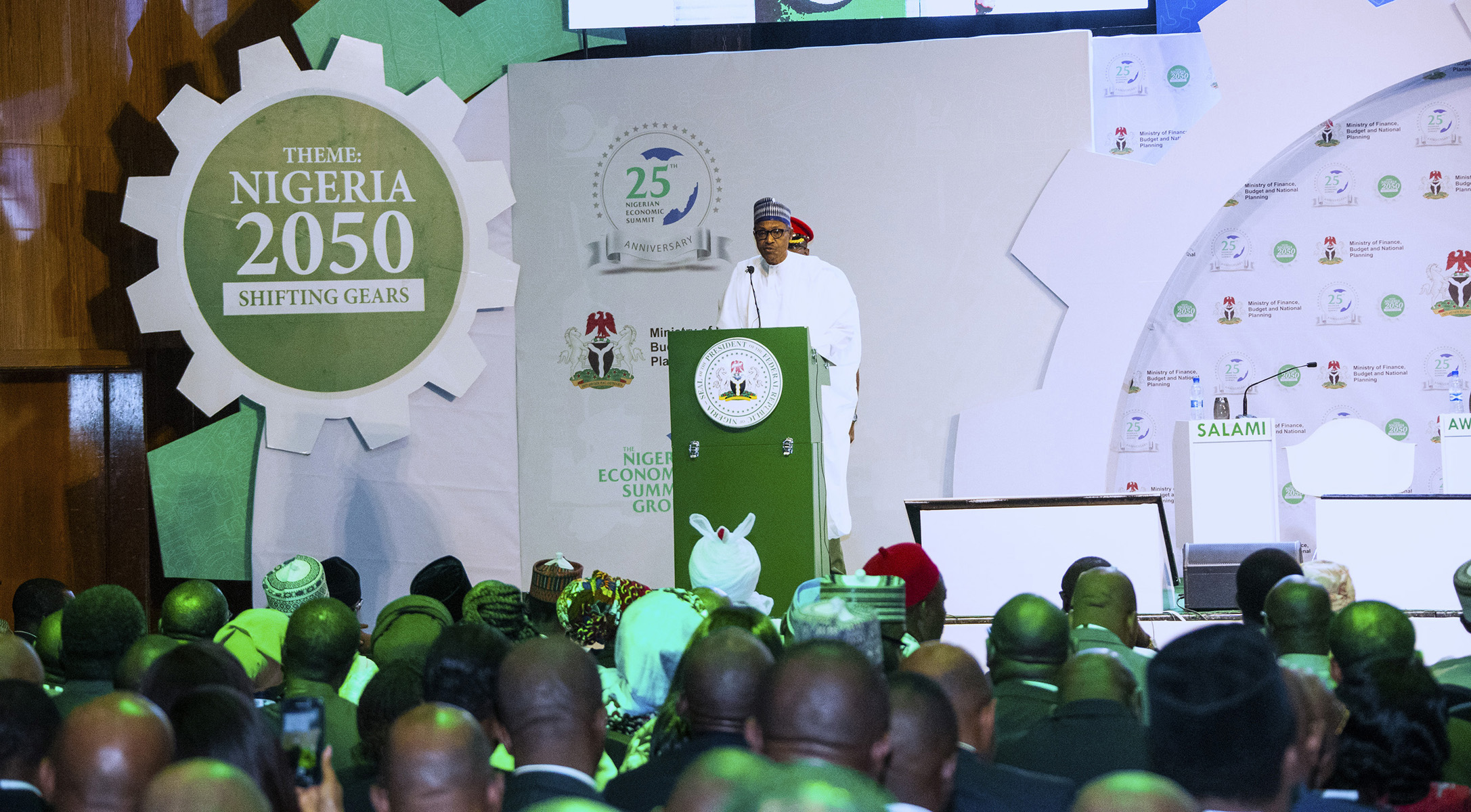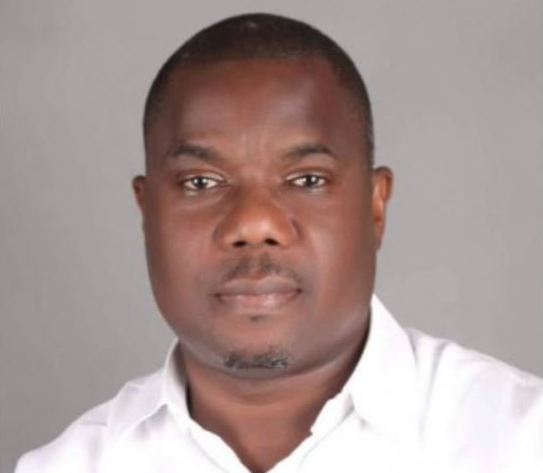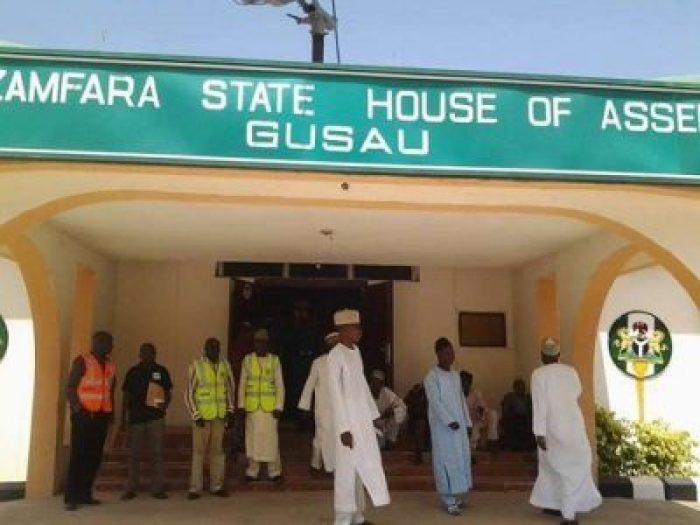PRESIDENT BUHARI DECLARES OPEN NESG A&B. President Muhammadu Buhari addresses the participants as he declares open the Nigerian Economic Summit Group conference held at the Transcorp Hilton Abuja. PHOTO; SUNDAY AGHAEZE. OCT 7 2019.
BY SAMUEL AKINNUGA
To a considerable degree, I agree with the axiom that the difference between a leader and a politician is that ‘a politician thinks about the next election while a leader thinks about the next generation’. If this is true all the time, it confirms that the politicians in Nigeria are not leaders and vice versa. How is it then that development agenda is almost always set by politicians who couldn’t care less about their commitments to actualise the plans other than occasional mouthing of vacuous assurances that make no sense even to the politicians.
But then this is Nigeria, right? As at today, the most prominent development agenda is the United Nations Sustainable Development Goals (SDGs). The SDGs are 17 lofty goals. These goals range from ending poverty to making quality education more accessible; from ending hunger to achieving gender equality which world leaders have committed to actualise in their respective countries.
It also includes the dominant issue of climate change which as it seems, Nigeria has not really woken to. There is the impression that the climate change is not an ‘African problem’. I hope we don’t miss it. In Africa, we have the Agenda 2063: The Africa We Want’ which is “Africa’s blueprint and master plan to transforming Africa into the global powerhouse of the future”.
The SDGs started in 2015 and expires in 2030. That is just about 11 years away. Agenda 2063, developed in 2013 and already in its sixth year will expire in 44 years. Nigeria had Vision 2020 and like everything that has a beginning, 2020 is just a few months away. By the milestones we set for ourselves in the vision, we know that we did not achieve the Millennium Development Goals (MDGs). As it also stands, and with the current quandary we are in, it is almost impossible to achieve the crux of the vision we had – that “by 2020, Nigeria will be one of the 20 largest economies in the world, able to consolidate its leadership role in Africa and establish itself as a significant player in the global and political arena”. Even with being Africa’s largest economy, we cannot beat our chests that we have been able to ‘consolidate our leadership role in Africa’.
Advertisement
Our handling of the unfortunate xenophobic attacks in South Africa confirms this. However lofty these goals are, it is senseless on the part of the politicians to make commitments they have no plan of keeping or give assurances without any intention to honour them. It would appear that we are excellent at expressly failing in our commitments to ratified agreements. (I hope that won’t be the case with the African Continental Free Trade Agreement). In this connection, we know one thing is sure. No, two things. The first is we will never come to global relevance with the same bunch of political leaders.
The second is a consequence of the first. If we do not adjust our bearing as a nation, the dominance we think we enjoy will be by virtue of our burgeoning population and nothing else. How prepared are we for the challenges of the future? How well have we fared in the achievement of the sustainable development goals? Is our population currently an asset or a liability? That is one, among many other pertinent questions that discussants at the 2019 Nigerian Economic Summit (NES) sought to address. The dichotomy between leaders and politicians earlier established comes in very handy here.
To the extent to which the dichotomy holds true, the visionaries and current leadership of the NESG can be said to be leaders on the merit of their agenda being championed for Nigeria’s fortunes in 2050. Nature has guaranteed that the majority of the political actors would not be around in 2050 hence the confirmation that the brains behind the NESG are indeed true leaders. The theme of the summit which also propitiously is the 25th Anniversary of the Nigerian Economic Summit Group (NESG) was “Nigeria 2050: Shifting Gears”. The key areas were achieving rapid industrialisation, sustainable peace and security, managing demography and transforming education (which was also the theme for this year’s International Youth Day). The choice of these focus areas is both epoch-making and momentous. Epoch-making because these issues, in addition to climate action dominate the agenda for global discourse. Momentous because the current handling of these issues would go a long way in determining the future of Nigeria.
Advertisement
Attending the Nigerian Economic Summit, for the first time, availed me the opportunity to gauge the readiness and commitment of corporate Nigeria to achieving the global goals. In that same vein, it was a veritable platform to hear the perspectives of public and private sector players on how much of a priority these issues enjoy in their current plans and programmes. The discussions during the plenary sessions were robust and incisive. The breakout sessions were equally as good in terms of depth of discourse and facilitation. I had the good pleasure of participating in a breakout session where the discussants were mainly governors. In my assessment of some of the comments made, I hold the view that some of them still don’t get it. Most of the submissions by the first term governors still hovered around the rot they met on the ground all of which was left by their predecessors and what they are doing to clean up the mess. This sounds like what we hear every day.
It would appear that the issues of the next few years are still very much viewed through the prism of the mentality that led us here. My two cents to the governors and other political actors: 2050 may seem very far but it is in reality, closer than we think. Just like yesterday, 2020 looked like it would never come. Human capital development must be at the core of government policies and programmes. It must be the most desirable goal to turn around the current liability that our population is to an asset that is equipped to drive innovation for the future. If we do nothing about the increasing number of out-of-school children, we may never be able to get out of the quandary we will find ourselves. The politicians whose names would be guaranteed in fine prints in our history books would be the ones who plant the trees so that future Nigerians can enjoy the shade. This is indeed a call to leadership. On the economic side, the SMEs must be provided with the most conducive business environment to thrive and drive economic growth.
Going forward, commitments must go beyond lip service and empty assurances to actually laying the foundation for a Nigeria that is poised to lead innovation. Leading and not just constantly playing catch-up on the global stage. The youth whose future is at stake in all of these have a role to play. More than ever, they must be untiring in their demands for what is desirable and must be ready to participate in the political process. They must never leave the future in the hands of those whom nature has guaranteed would not be a part of it. Beyond participation, they must ensure that their voices are heard. They must do away with unwholesome attitudes and social vices that characterise the old order they should work to displace. In the 25 years of its policy discourse and advocacy, there is really nothing new that is being said. We know what we must do to guarantee a prosperous Nigeria. I hope we find the will, wherever it may be found to do what is right.
ON A LIGHTER NOTE
Advertisement
The two days of the summit remain one of my biggest highlights of 2019. I particularly enjoyed the evening setup. After long sessions of deliberation and networking, the soiree was always something to look forward to with colourful performances from young Nigerians who further prove that our best resource is not our oil (which would soon be out of fashion) but our young people. We have continued to fail them. May we not repeat the same mistakes.
ENCOMIUMS
Nigerians should be proud that we have a formidable think-tank in the Nigerian Economic Summit. I extend a warm handshake to every member of the organizing committee for a good job done. In closing, I advise that young, bright and passionate Nigerians also rally themselves into youthful think-tanks that are able to tackle the global issues head-on and suggest alternative views to issues of today that could impact positively or otherwise, our shared prosperity. God bless Nigeria.
Advertisement






